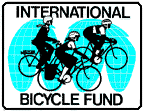
President suspends bicycle taxi ban
Bujumbura - Burundi's president on Tuesday suspended a
controversial ban on bicycle taxis less than 24 hours after his
transport minister sparked a public uproar by ordering them off the
streets.
President Dometien Ndayizeye temporarily lifted the ban until its
implications - including the anticipated loss of employment for an
estimated 100 000 drivers - can be studied by a special committee,
officials said.
"President Ndayizeye decided to suspend the minister for transport's
order to prohibits the bicycle taxi trade in Burundi," presidential
spokesman Pancrace Cimpaye said.
"A decision (on the ban) will be made soon after an ad hoc commission can study it," he said.
| Bicycle taxis have long been a critical component of transport |
Bicycle taxis have long been a critical component of transport in the impoverished central African nation that is still emerging from a nearly 12 year civil war that has claimed some 300,000 lives.
In an interview with state radio Ndikumugongo acknowledged the decision was controversial said it was necessary to reduce accidents, many of them fatal, caused by bicycle taxis which often weave perilously through motorized traffic.
"We know the measure is unpopular but we had to choose for the good of the greatest number," he said.
The move had immediately been denounced as unfair and discriminatory to Burundi's 100 000 bicycle taxi drivers, who earn between 2 000 and 3 000 Burundi francs (about R12) a day and must support their families on that meager income.
| 'For these people, the bicycle is their only livelihood' |
He said the step would likely create more problems than it would solve by taking away the only chance for many young Burundians to earn a wage.
"For these people, the bicycle is their only livelihood, they thus will not continue and that just will increase the number of corrupt civil servants," he Rufyiri said.
"But mostly, we fear the reaction of these young men who will have no hope," he said. "The situation could degenerate."
Published on the Web by IOL on 2005-04-26 16:13:27
© Independent Online 2005. All rights reserved. IOL publishes this article in good faith but is not liable for any loss or damage caused by reliance on the information it contains.
 Thank
you to our friends at the International Bicycle Fund
for providing and maintaining this web site.
Thank
you to our friends at the International Bicycle Fund
for providing and maintaining this web site.
